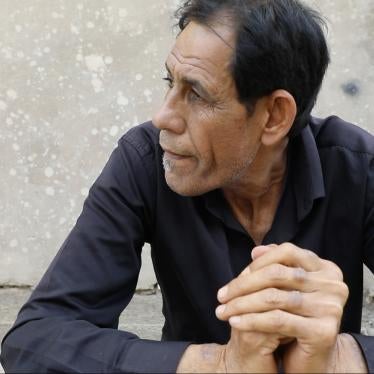Last week, the prosecutor in the first military commission trial held at Guantanamo Bay stood before a sentencing jury and described the “global war on terror” as a “figurative battle of ideologies,” with freedom and liberty on one side and those wanting to kill freedom and liberty on the other. Jennifer Daskal, advocacy director, US Program, says that it’s hard to see how Guantanamo is advancing the cause.
Close to 400 detainees have been held there for more than five years, without charge and without the time-honored right to contest the legality of their detention. The only detainee to have had his day in court – an Australian named David Hicks – was not charged with engaging in terrorism himself, and was described as fleeing every battlefield he was accused of being near.
After five years of detention and one chaotic day in the courtroom, Hicks accepted a deal to serve nine months in prison. He also agreed not to talk to the media for a year, never to sue US officials regarding his treatment, and never profit from publicity about his experience. The government seemed more interested in silencing Hicks’ allegations of abusive treatment than in punishing him for any crimes.
Meanwhile, the Wall Street Journal reported that one of the lead prosecutors for the Guantanamo military commissions, Lt. Col. V. Stuart Couch, had refused to prosecute another prisoner – this one accused of a real connection to the September 11th attacks – because the only evidence against him had been obtained through torture.
President George W. Bush’s own Secretary of Defense, Robert Gates, has told Congress that “because of things that happened earlier at Guantanamo, there is a taint about it. . . . No matter how transparent, no matter how open the trials, if they took place in Guantanamo, in the international community they would lack credibility.” After his appointment, Gates urged Bush to close Guantanamo and move the trials of terrorist suspects to courts in the United States.
The president did not listen to his new Defense Secretary’s advice, but Congress should. Its first order of business should be the restoration of habeas corpus for Guantanamo detainees. This ancient right, which dates back to early English law, allows prisoners to challenge the legality of their detention, thereby limiting the government’s ability to detain people without legal justification.
But legislation passed by the last Congress stripped the right to habeas away from any non-citizen determined by the president to be an “unlawful enemy combatant.” This means the Bush administration could, in theory, arrest any non-American including on US soil and detain him without charge – forever – merely by labeling him an “enemy combatant.”
Senator Arlen Specter, the ranking Republican on the Senate Judiciary Committee, has introduced legislation to undo these habeas-stripping provisions. But he won’t succeed without the support of other leaders, including Nebraska’s senior Senator Chuck Hagel.
The Bush administration opposes these efforts, arguing that it has not and will not abuse this power. The administration claims to be holding only the most dangerous terrorists at Guantanamo, and argues that the commander-in-chief shouldn’t have to answer to civilian courts in his pursuit of the “war on terror.”
But there is growing evidence that many if not most of the detainees in Guantanamo are not the “worst of the worst” the US government alleges them to be. Hundreds picked up in Afghanistan or Pakistan had no connection to al Qaeda, but rather were sold to the US by bounty hunters or turned over by rival clan members trying to settle a vendetta, often for thousands of dollars.
If the detainees are not the high level terrorists the administration claims them to be, habeas proceedings could expose what may have been a fundamental flaw in US counterterrorism policy. The administration’s attack on habeas may just be an attempt to hide its intelligence failures. If, however, the administration’s account is true, such hearings will confirm the administration's allegations and prove to the world the accuracy of its assertions.
As the prosecutor in the Hicks case recognized, the fight against terrorism is to a large extent a fight for hearts and minds. Restoring habeas should be an easy way for Congress to help the United States regain the moral authority needed to successfully combat terrorism – and send a message to the president, and the world, that he is not above the law.








